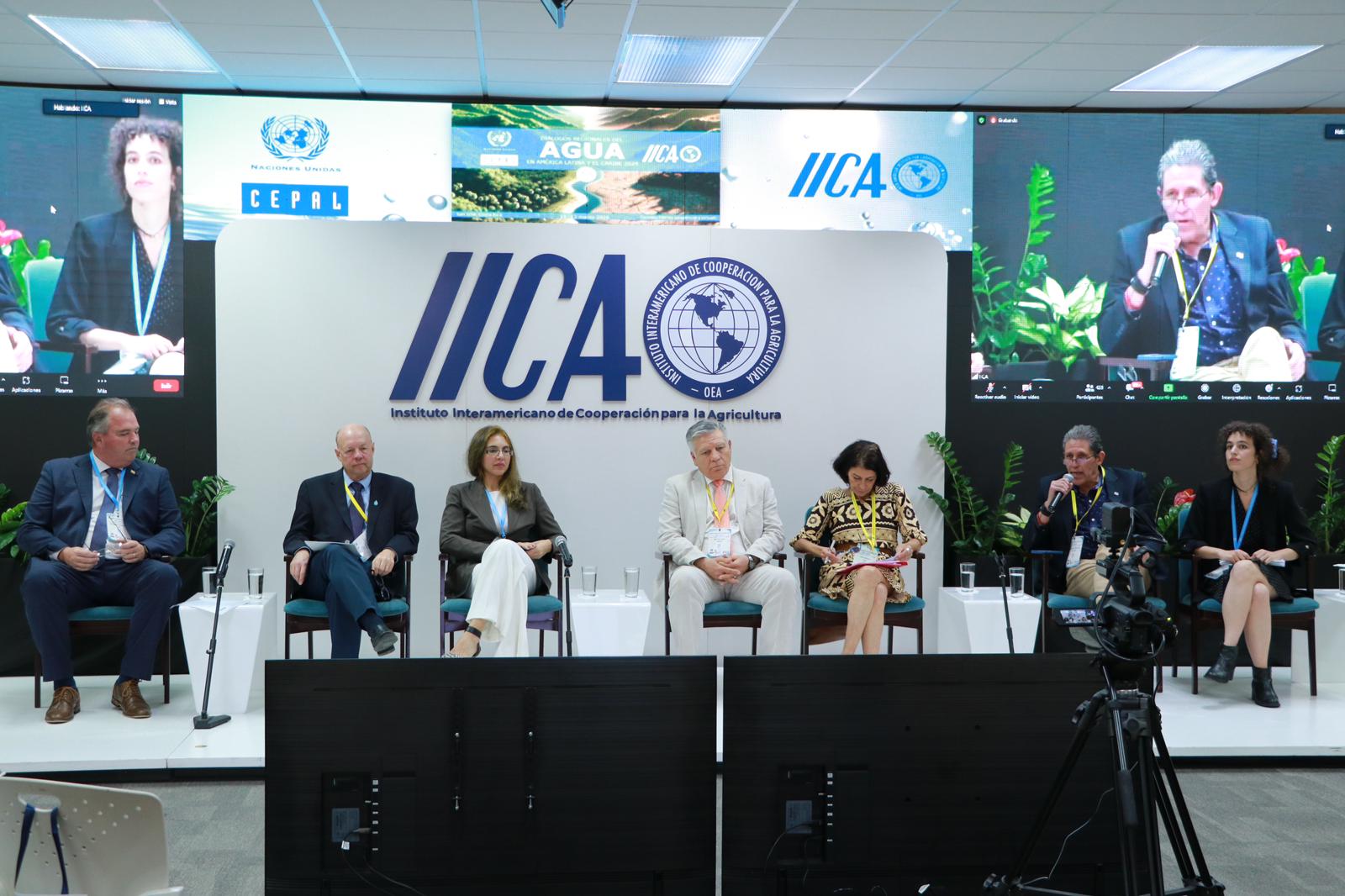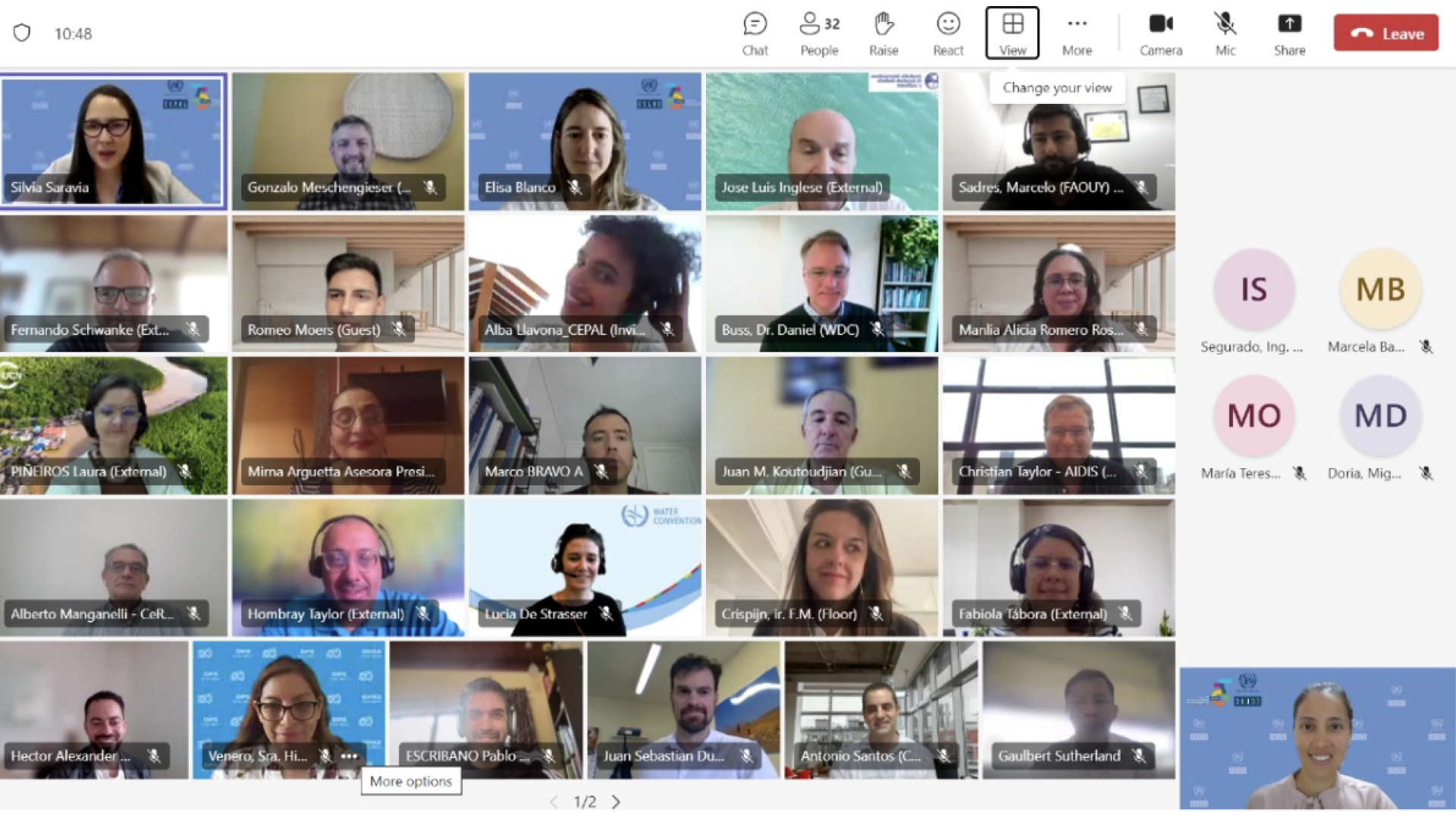Briefing note
The first session of the 2024 Regional Water Dialogues, titled "Water, Agriculture, and Ecosystems," aimed to enhance the capabilities and conditions of countries to perform orderly, sustainable, competitive, and inclusive water resource management, aligned with the agricultural and ecosystemic challenges of the region. High-level and technical panels brought together senior authorities from the LAC countries and experts representing the public sector, international organizations, development banks, academia, and the private sector to discuss various strategies and solutions for water resource management.
The session began with a keynote speech by Mr. Manuel Otero, General Director of IICA, who highlighted the Hemispheric Water and Agriculture Initiative launched in October 2023. This initiative seeks to have the agricultural sector contribute to addressing the regional water crisis, considering water's fundamental role in agriculture and, consequently, food security. He noted that the initiative has four main lines of work focused on i) water production and storage; ii) improving water use efficiency; iii) strengthening mechanisms, tools, and capacities associated with water governance for agriculture by ministries and governing institutions of water; and iv) improving the planning, allocation, and public-private articulation of pre-investment and investment resources in countries for agriculture. He also acknowledged ECLAC for its cooperation efforts.
High-Level Panel:
In the High-Level Panel, leaders and experts highlighted solutions and strategies against the water crisis in agriculture, emphasizing climate change adaptation, the importance of science in sustainable agriculture, and the need for collaboration and specific financing to improve water resource management.
-
Mr. Víctor Carvajal Porras, Minister of Agriculture and Livestock of Costa Rica, talked about the water crisis and agriculture as a key actor in its solution, highlighting projects like "Water for the Bajura" and the importance of rewarding forest preservation through environmental service payments and access to financing.
-
Ms. Laura Suazo, Secretary of State for Agriculture and Livestock of Honduras, shared experiences of extension services in municipalities of the dry corridor mainly focused on water storage and harvesting. She also highlighted the importance of intersectoral collaboration for climate change adaptation, where they work in agroclimatic tables with various sectors. She also mentioned the national irrigation master plan they are working on for the next 20 years.
-
Ms. Renata Bueno Miranda, Secretary of Innovation, Sustainable Development, Irrigation, and Cooperativism of Brazil, highlighted Brazil's adaptation history and the role of science in agricultural transformation, mentioned the low-carbon agriculture Plan ABC and emphasized the need to accelerate the technological transition in the sector. She also noted the use of cropping techniques to improve the hydrological cycle, such as the direct application of organic matter.
-
Ms. Rossana Polastri, Regional Director for Latin America and the Caribbean of IFAD, highlighted IFAD's mandate on integral water resource management, which largely focuses on rural poverty. She highlighted two examples of projects that lead and allocate financing especially to small-scale producers in Brazil and the dry corridor to improve access to water resources.
-
Mr. Nick Kenner Estrada Orozco, Deputy Minister of Rural Economic Development of Guatemala, presented the challenges and strategies of Guatemala on the topic of irrigation and the importance of cooperation for the implementation of infrastructure. Another barrier he mentioned is governance, indicating the need to strengthen local governance and resort to agrarian agreements to reduce conflict.
-
Mr. Mario Lubetkin, Representative for Latin America and the Caribbean of FAO, emphasized the importance of IWRM and efficiency for sustainable agriculture. He also reaffirmed his commitment to work with the region's countries to put water as a central element of change, and support them to improve management capacity, information, and analysis. Thus, his motto emerged: “Water not to damage the soils, and soils not to damage the water”.
-
Mr. Franz Rojas, Director of Water and Sanitation at CAF, pointed out that efficient water management for agriculture is required, along with policies to support this process. He also explained that different solutions are needed for family and extensive irrigation types, in which CAF is actively working through various projects. He emphasized that to operationalize financing for sustainable irrigation, it is necessary to position the topic on public agendas, increase funds allocated to this purpose, create pre-investment designs, strengthen governance, and also consider social aspects.
Technical Panel:
The Technical Panel of the Session provided a technical deep dive into the challenges and solutions in water management for agriculture and ecosystem conservation. Experts highlighted the importance of an integrated and multidisciplinary approach that addresses both the water needs of agriculture and the preservation of ecosystems.
-
Mr. José Miguel Zeledón, National Water Director of the Ministry of Environment and Energy (MINAE), Costa Rica, discussed the challenges of achieving SDG 6 in Latin America and the Caribbean, highlighting the lack of coordination and financial gaps as major obstacles. He advocated for management models that reinvest resources in source basins and promote effective local management.
-
Ms. Monica Rodrigues, Economic Affairs Officer of the Agricultural Development Division of the Economic Commission for Latin America and the Caribbean (ECLAC), emphasized the need to increase food production sustainably, noting the low efficiency in the use of water resources in the region. She highlighted the importance of digitalization and the agroecological transition to improve water and land productivity.
-
Ms. Tania Ammour, Advisor to the Regional Directorate of the International Union for Conservation of Nature (IUCN), stressed the dual climate and biodiversity crisis, underscoring the need to consider agriculture within interconnected landscapes for ecological conservation and restoration. She proposed a basin-level planning approach that integrates land and water use.
-
Mr. Héctor Manuel Árias, Director of Sustainability and Strengthening of the National Commission of Arid Zones (CONAZA), Mexico, discussed the challenges of water governance and drought attention, proposing improvements in user participation, conflict management, and the collection of financial resources for more effective water management.
-
Mr. Christopher Neale, Director of the Water for Food Institute at the University of Nebraska, highlighted the importance of water storage and the development of technologies to monitor and optimize water use in agriculture. He advocated for a shift towards agricultural practices that maximize value and sustainability rather than just yield.
-
Ms. Alba Llavona, Water Resources Specialist at the Economic Commission for Latin America and the Caribbean (ECLAC), promoted the dissemination of the advantages of implementing Nature-Based Solutions (NBS) as key to improving water and food security, emphasizing wetland conservation and forest restoration to increase water retention in the soil. She also mentioned that ECLAC will soon publish a document detailing this topic.
The Technical Panel illustrated a consensus on the urgency of addressing water management comprehensively, considering both agricultural needs and ecosystem preservation. Experts agreed on the need to adopt innovative technologies, sustainable practices, and cross-sectoral policies that promote efficient water management, thus reinforcing the sustainable development goals in the region. Cooperation among countries, sectors, and communities was emphasized as essential to overcome the challenges presented and move towards a more sustainable and resilient future in Latin America and the Caribbean.
The session closed with a call to action towards the development of bottom-up public policies, improving water use efficiency through technological innovation, and strengthening governance and planning for water management in agriculture. Recognizing that multiple and collaborative efforts are required, the importance of cooperation and joint commitment to progress towards sustainable and inclusive water management in Latin America and the Caribbean was underscored.
Audience Participation, Both In-Person and Virtual
Throughout the session, various interactive activities through the Slido platform included a series of questions to collect the audience's opinions and reflections on the Regional Water Dialogues. This allowed for the participation of those in the room as well as those joining virtually. Below are more details on the responses obtained.
Participants from several countries in the region took part in the session, with the majority of participants from Mexico, Costa Rica, Peru, Colombia, Argentina, and Guatemala. They mainly came from the public sector (29%) and academia (29%), followed by the private sector (14%), international organizations (11%), civil society (10%), NGOs (8%), and others (1%). Moreover, the session had nearly equal participation of women and men, with a representation of 48% and 52% respectively.
The first question addressed by the audience was: "Is the current investment in innovation sufficient to ensure water security in agriculture in the context of the climate crisis?" 99% of participants responded that the current investment is insufficient. This result underscores the urgency to increase efforts and resources dedicated to innovation in the water sector to face the challenges posed by climate change in agriculture.
In the second interactive activity, participants identified the components they consider fundamental for sustainable and inclusive water management that ensures food security in the region. The results highlighted governance as the primary element, followed by investment, then innovation, conservation, and finally data and information. This finding underscores the need to strengthen the current water governance frameworks and increase investment in infrastructure and technologies that promote the efficiency and sustainability of water use in agriculture.
Lastly, the audience was presented with the following question: "Is the protection and restoration of ecosystems in water management fundamental? Are you familiar with Nature-Based Solutions (NBS) as a means to increase water availability for agriculture?" However, 30% of respondents admitted they were not familiar with Nature-Based Solutions (NBS) as a means to increase water availability for agriculture, indicating a significant opportunity to improve the dissemination and understanding of these strategies. NBS offer an innovative and sustainable approach to water resource management, leveraging ecosystem services to improve not just the availability but also the quality of water.
This collection of contributions and opinions highlights the public's perception of the importance of innovation, effective governance, and strategic investment in water resource management, as well as the need to increase awareness and knowledge about nature-based solutions. Together, these elements are crucial for moving towards a future where water and food security are guaranteed for all, even in the context of a global climate crisis.
For more information:
-
Hear the opinion of experts that attended the Regional Water Dialogues 2024
-
Read the opening words of the Executive Secretary of CEPAL, José Manuel Salazar-Xirinachs
News:
Publications of interest:



